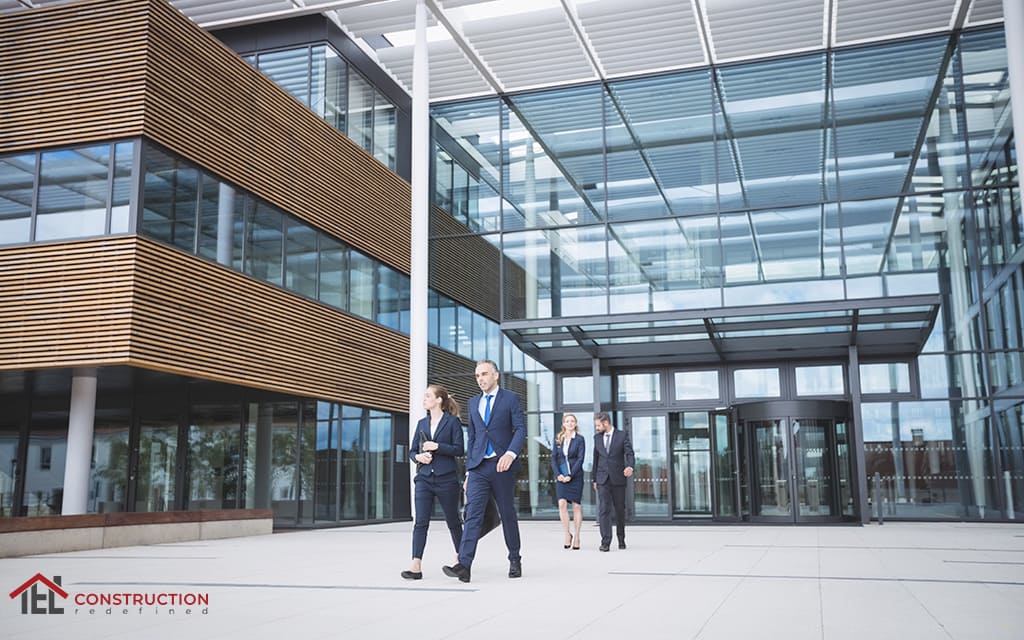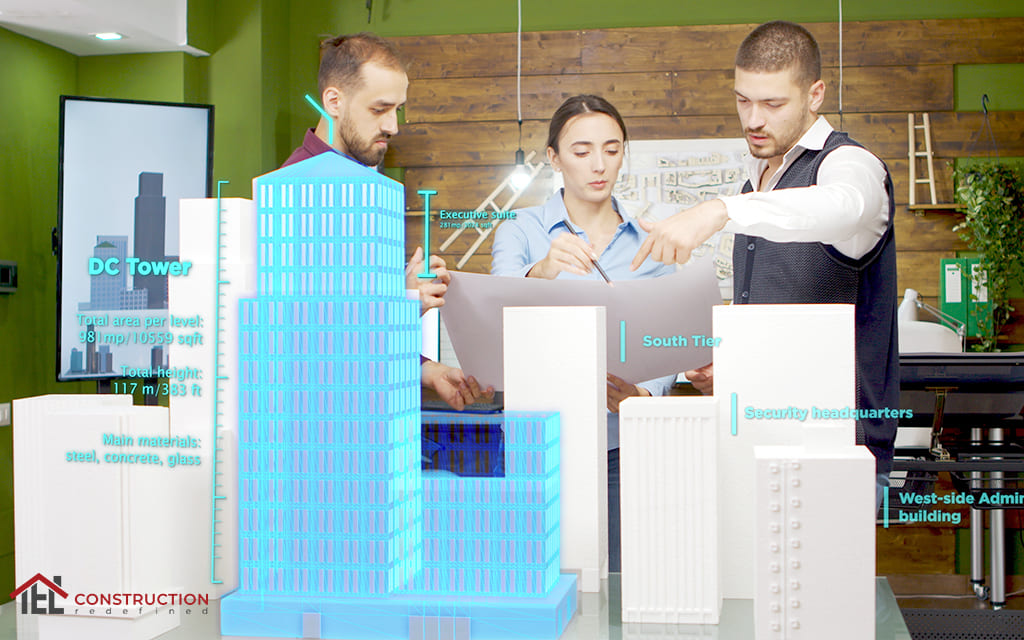“Alone we can do so little; together we can do so much.” – Helen Keller
And, when it comes to construction industry, collaboration helps the projects to stay on track, avoid rework, and keep them within budget irrespective of their size or complexity.
Infact, a perfect collaboration between the stakeholders is the key driver towards ideal project management scenario.
Building a dream home requires more than just bricks and mortar; it requires a collaborative effort between the client, architect, and contractor to create a masterpiece that stands the test of time.
It takes two to Tango!
Right collaboration ensures where every voice is heard, every idea is valued, and every detail is executed to perfection.
Yes, let’s dive deep and understand how the power of collaboration between architects, clients and the construction contractors can turn a home renovation or new build project into a seamless and successful endeavour.
Understanding the Role of Client, Building Contractor, and Architect
In the construction industry, understanding the essential roles of the client, architect, and contractor is crucial for the successful and efficient completion of any project.
👉 The Client:
Also known as the owner, has clear goals, expectations, and a budget that must be aligned with these goals.
👉 The Architect:
An architect plays a key role in guiding the client, proposing sustainable design solutions, and providing accurate, detailed drawings that meet the client’s requirements and comply with building codes and zoning criteria.
These drawings become the client’s contract with the design and build company.
👉 The Building Contractor or the Construction Company:
The construction company London must be reliable, responsible, and trusted having the right expertise and experience to manage the project as designed and documented.
How collaboration between clients, architects and building contractor helps the Projects to Succeed?
It is essential for all three parties to work together in harmony, maintaining open dialogue and troubleshooting as a team to address any unforeseen issues or client-initiated changes.
1. Comprehensive Access to Information and Insights for better decision making:
A collaborative approach ensures that all stakeholders contribute their unique perspectives and expertise. Clients provide insights into their needs, architects bring design creativity, and contractors offer construction feasibility.
2. Enhances Accuracy in Construction Work and minimize misunderstanding:
Architects work closely with clients to understand their vision, translating it into detailed plans. Contractors, with their on-site experience, contribute valuable insights into the feasibility and potential challenges during the construction phase.
3. Reduces Inefficiencies and Delays:
Collaboration fosters proactive problem-solving. Regular communication allows for the identification of potential issues before they escalate, reducing the likelihood of project delays.
4. Client Satisfaction and Long-Term Success:
Collaboration ensures that the final outcome aligns with the client’s expectations and fosters client satisfaction. Additionally, successful collaborations set the foundation for long-term relationships, creating a positive reputation for all parties involved.
HOLD ON, there must be many questions running down in your mind related to What is the role of the architect with the client and contractor? And How do contractors and architects work together?
Relax, let’s understand the roles and the collaborative impact one by one in detail.
What is the Role of an Architect in a Construction Company?
It’s multifaceted.
Yes, architects are the ones responsible for the planning, design, and oversight of construction projects.
➤ Understanding client’s vision:
They work closely with clients to understand their needs and vision for the project and then create designs and plans that meet these requirements while also adhering to building codes and regulations.
➤ Collaboration and coordinating with other Professionals:
Architects also collaborate with other professionals, such as engineers and contractors, to ensure that the project is completed on time, within budget, and to the client’s satisfaction.
Architects bring creativity, technical expertise, and problem-solving skills to the construction process, ensuring that the final product is both functional and aesthetically pleasing.
➤ Complying to business codes/Regulations:
Architects are responsible for ensuring that construction projects comply with planning permission and building regulations.
They incorporate legal requirements into their designs and plans, working closely with clients and construction contractor in London to create structures that meet regulatory standards while fulfilling the client’s vision.
➤ Add Sustainability into Designs
Additionally, architects play a crucial role in ensuring that their designs and practices followed are environmentally sustainable and energy efficient.
They take into multiple factors into consideration such as the building’s orientation, materials used, and energy systems to minimize the project’s environmental impact and reduce operating costs.
How do Clients and Architects work together?
The architect’s role is to provide technical services to design a functional and structurally sound house while it stands as the responsibility of the client to provide goals, expectations, and a budget to the architect.
The architect should also:
- Understand the client’s needs, goals, and aspirations
- Guide the client
- Propose reasonable, sustainable design solutions
- Provide accurate, detailed drawings
- Educate the client about the architect’s role
To gather information from a client, an architect can use multiple methods and sources. These methods include:
- Interviews
- Surveys
- Workshops
- Focus groups
- Observations
- Site visits
The client has two contracts: one with the architect and the other with the contractor. The architect works for the owner during the construction phase to ensure that the construction documents are interpreted correctly and advocates for the owner.
It is important to be cautious of traits of cowboy builders who do not wish to involve an architect, as the architect works for the owner to ensure that the investment in the contract documents is realized.
What is the Relationship Between Contractor and Architect?
Explore the relationship between contractors and architects and how it impacts the successful execution of construction projects.
- Sharing knowledge about Advanced Construction Technologies:
Construction contractors bring their expertise, experience and knowledge about latest and future construction technologies to the table.
This may help the architects to plan the design from the initial stages itself or any changes that may be required during the course of time.
- Early Collaboration Benefits:
The collaboration between contractors and architects allows for the exchange of ideas and opinions before the commencement of construction, fostering a synergistic team atmosphere and ensuring that all perspectives are considered.
- Risk Mitigation and flawless construction:
Contractors play a crucial role in identifying conditions that could mitigate long-term risks, preserving the integrity of the building being constructed.
Learn here some of the main reasons of failure of building foundation?
- Communicating Local Regulations and Site Conditions:
A contractor’s familiarity with local building regulations, planning permissions UK and site-specific conditions provides architects with essential insights that can impact the design and construction process.
- Most accurate and efficient cost:
Contractors provide architects with current cost information and recommendations for the most efficient and cost-effective construction equipment, aiding in the project’s financial planning and execution.
Breaking the Myth: Collaboration can Erode Individual Accountability
The myth that collaboration in construction projects can lead to a loss of individual accountability is a common misconception.
While it is true that collaboration requires a collective mindset, it does not mean that individual accountability is diluted.
Instead, collaboration act as a catalyst for accountability, where everyone understands their roles and contributes to the project’s success.
By embracing open communication, trust, and shared objectives, project teams can leverage each other’s strengths, mitigate risks, and unlock innovative solutions.
It is essential to strike the right balance between collaboration and individual accountability to ensure the project’s success.
What are the benefits of collaborative working in the built environment?
Have a look at advantages of architect, contractor and client partnership.
- Enhanced communication and understanding
- Efficient problem-solving
- Improved project outcomes
- Shared expertise and insights
- Streamlined decision-making
- Increased innovation and creativity
- Reduced confusion
- Greater client satisfaction
How to find a contractor in London?
When it comes to finding the right construction contractor in the bustling metropolis of London, meticulous research is key. Follow these steps to ensure you choose the best:
1. Conduct a Local Search:
Start with a Google query or search engine exploration for “construction contractor near me” or “construction company near me” to identify the top in London.
2. Explore About Us Pages:
Dive into each contractor’s About Us page to understand their ethos, values, and commitment to excellence. This insight provides a glimpse into their company culture and dedication to client satisfaction.
3. Assess Expertise and Experience:
Also, the about us page will give you insights about their expertise and experience. Look for a seasoned team with a track record of successfully delivering diverse construction projects. Experience speaks volumes in ensuring your project’s success.
4. Scrutinize the Portfolio:
Delve into the portfolio and past work of each contractor. This step allows you to gauge the quality of their craftsmanship and the range of projects they have undertaken. A robust portfolio is indicative of a contractor’s capabilities.
5. Request a Quotation:
Obtain quotations from the shortlisted contractor for building construction contracts. Pay attention not only to the cost but also to the clarity and transparency in the provided quotes. This step gives you an understanding of the financial aspect of your collaboration.
6. Evaluate Responsiveness:
Gauge the responsiveness of each contractor during the quotation process. A contractor who communicates effectively and promptly is likely to maintain clear and open lines of communication throughout the project.
Discover Excellence with TEL Constructions – Your Premier Construction Partner in London
In this search for the best construction contractor UK, one name rises above the rest – TEL Constructions. Headquartered in Hayes, TEL Constructions stands as the epitome of excellence in the construction industry.
Why TEL Constructions?
👉 TEL Constructions boasts a stellar reputation as a trusted and reliable construction partner in London.
👉 With a seasoned team of experts, TEL Constructions brings a wealth of experience to the table, ensuring the successful execution of diverse projects.
👉 Explore our extensive portfolio showcasing the successful completion of projects across various sectors.
👉 TEL Constructions is committed to client satisfaction, prioritizing clear communication and exceeding expectations.
👉 Known for the reliability and trustworthiness, TEL Constructions is the name you can back for best after-sale services.
Embark on your construction journey with confidence, knowing that TEL Constructions is your dedicated construction partner.
Bottom Line
Together, architects, builders, and clients make a winning team in construction. Their teamwork brings ideas to life, making projects successful and satisfying for everyone involved.
In this collaboration, they build not just structures but lasting connections and shared accomplishments.
Contact us at 02081584006 or just drop an email at support@telconstructions.co.uk. Your project deserves nothing but the best, and TEL Constructions delivers excellence at every step.














